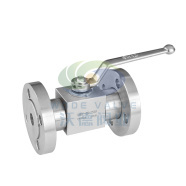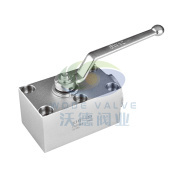News
The Comprehensive Guide to Hydraulic Ball Valves: Functionality and Applications
Time:
Feb 23,2025
Hydraulic ball valves are critical components in various industrial applications, particularly in the control and regulation of fluid flow. These valves are designed to provide a reliable and effective means of managing pressure and flow, making them indispensable in many hydraulic systems. Their simple yet robust design allows for efficient operation, reducing the potential for leaks and failures.
The primary function of a hydraulic ball valve is to control the flow of fluids through a pipeline. They consist of a spherical ball with a hole through the center, which acts as a port. When the valve is open, the hole aligns with the flow direction, allowing fluids to pass through. Conversely, when closed, the ball rotates to block the flow. This straightforward operation provides a tight seal, which is essential for high-pressure applications often seen in hydraulic systems.
One of the significant advantages of hydraulic ball valves is their ability to operate swiftly. The quarter-turn operation ensures that the valve can be opened or closed rapidly, which is crucial in processes that require immediate flow control. Additionally, these valves are known for their durability and longevity, as they are made from high-quality materials that can withstand harsh conditions, including extreme temperatures and corrosive environments.
In terms of applications, hydraulic ball valves are widely utilized in various industries such as oil and gas, chemical processing, water treatment, and manufacturing. They are often used in systems that require quick shut-off capabilities or precise flow regulation. For instance, in oil and gas operations, these valves can manage the flow of crude oil through pipelines, ensuring safe and efficient transport.
Another significant aspect of hydraulic ball valves is their versatility. They can be designed in different sizes and configurations to meet specific operational requirements. This adaptability allows engineers and operators to customize their systems for optimal performance, whether it involves high-volume flow applications or precise control of smaller fluid streams.
Furthermore, maintenance of hydraulic ball valves is relatively straightforward. Regular inspections and servicing can help identify potential issues before they escalate, ensuring the valve’s continued performance and reliability.
In conclusion, hydraulic ball valves are an essential part of industrial fluid control systems. Their efficient operation, durability, and versatility make them a favored choice among engineers and operators. Understanding their functionality and applications can lead to improved system performance, reduced downtime, and enhanced safety in various industrial environments. By integrating hydraulic ball valves into your systems, you can achieve superior control over your fluid dynamics.
The primary function of a hydraulic ball valve is to control the flow of fluids through a pipeline. They consist of a spherical ball with a hole through the center, which acts as a port. When the valve is open, the hole aligns with the flow direction, allowing fluids to pass through. Conversely, when closed, the ball rotates to block the flow. This straightforward operation provides a tight seal, which is essential for high-pressure applications often seen in hydraulic systems.
One of the significant advantages of hydraulic ball valves is their ability to operate swiftly. The quarter-turn operation ensures that the valve can be opened or closed rapidly, which is crucial in processes that require immediate flow control. Additionally, these valves are known for their durability and longevity, as they are made from high-quality materials that can withstand harsh conditions, including extreme temperatures and corrosive environments.
In terms of applications, hydraulic ball valves are widely utilized in various industries such as oil and gas, chemical processing, water treatment, and manufacturing. They are often used in systems that require quick shut-off capabilities or precise flow regulation. For instance, in oil and gas operations, these valves can manage the flow of crude oil through pipelines, ensuring safe and efficient transport.
Another significant aspect of hydraulic ball valves is their versatility. They can be designed in different sizes and configurations to meet specific operational requirements. This adaptability allows engineers and operators to customize their systems for optimal performance, whether it involves high-volume flow applications or precise control of smaller fluid streams.
Furthermore, maintenance of hydraulic ball valves is relatively straightforward. Regular inspections and servicing can help identify potential issues before they escalate, ensuring the valve’s continued performance and reliability.
In conclusion, hydraulic ball valves are an essential part of industrial fluid control systems. Their efficient operation, durability, and versatility make them a favored choice among engineers and operators. Understanding their functionality and applications can lead to improved system performance, reduced downtime, and enhanced safety in various industrial environments. By integrating hydraulic ball valves into your systems, you can achieve superior control over your fluid dynamics.
RELATED NEWS




